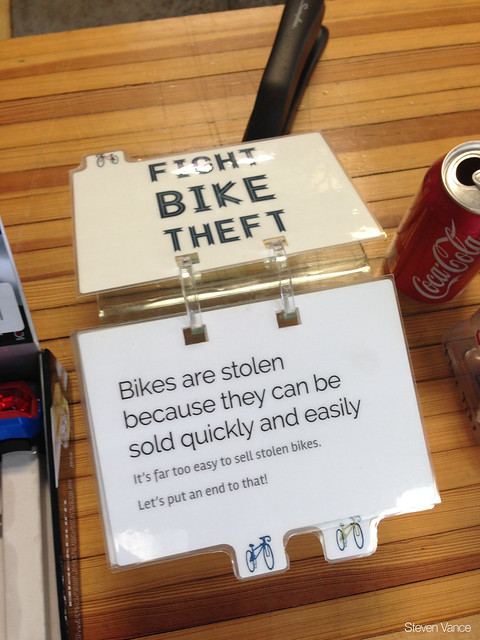Bike theft is a problem in Chicago. The Chicago Stolen Bike Registry has received 98 stolen bike reports already this month. That's at least 98 people who need to get a new ride to work or school. The Chicago Police Department accepts reports of bike theft but doesn't track them, so we don't have more reliable stats on how many bikes are stolen in Chicago.
Recovery rates are abysmal. Many people don't register their bicycles, and bikes disappear from the city after they're stolen. When police do recover a bicycle, the officers check their department's registry for it. It's rare that the bike's owner will have registered it, since the process is obscure and not user-friendly. Bike shops recover many stolen bikes when the new owner (who might not know it's stolen) brings the bike in for service. Mechanics at many shops check the Chicago Stolen Bike Registry if they suspect something is off about a bike.
Matt Lemoine, a bike mechanic at Ciclo Urbano, said he comes across a lot of spray painted bikes "and that's a pretty good indicator" that it's stolen. Another oddity he mentioned is that people will come in with clipless pedals but be riding with tennis shoes. "If I think a bike is stolen," Lemoine said, "I'll talk to the person a little bit. Sometimes I'll ask how much they paid for it and they may say $200 but I know it's a $600 bike."
Needless to say, all this detective work isn't an ideal way to ID stolen bikes. And we haven't even touched the problem of making sure that a bike you purchase via Craigslist isn't stolen.
Enter Bike Index, a venture founded in Chicago that catalogs bikes before they're stolen as well as after. The goal is create a universal registry that will make it much easier for people to avoid buying stolen bikes. And if the market for stolen bikes dries up, bike theft won't be so prevalent anymore.
Founder Seth Herr envisions Bike Index as a way to solve the "awareness problem" -- awareness of existing registries and of a bike's identifying information. In an interview for the Bike Index promo video, Yojimbo's Garage owner Marcus Moore said, "A common problem when people get their bikes stolen is that it's like the first time the owner thinks about 'What was my serial number?' and other details that are important in recovering a stolen bike." If every bike shop integrated Bike Index registration at the point of sale, that would make it easy for victims of bike theft to accurately report a stolen bike, and for bike purchasers to verify that they aren't buying stolen goods.
While Bike Index aims to be a national registry, it could collaborate with local efforts to catalog and prevent bike theft. The Chicago Stolen Bike Registry and Bike Index have talked about integrating their two sites so that people who post to CSBR get more exposure on Bike Index and vice versa. Justin Newman, a technical contributor to CSBR, said, "We'll support virtually any attempt to increase bike registration because it gives people some shot of being able to identify and recover" a stolen bike.
Bike Index needs to grow and gain exposure if it's going to work as intended. On Kickstarter, Bike Index is trying to raise $50,000 to continue developing the website registry and travel around the United States to meet with bike shop owners and discuss integrating registration into the bike purchase. The Bike Lane (a sponsor of Streetsblog Chicago) is already doing that by paying the $5 registration cost for customers when they buy a bicycle.
The project is open source software and has 26 days and $41,000 more to go. Lemoine, the mechanic, added, "I'm really happy that [Herr's] starting the Bike Index because I can't prove they're stolen unless they're registered somewhere. It's disheartening because there's nothing I can do."






